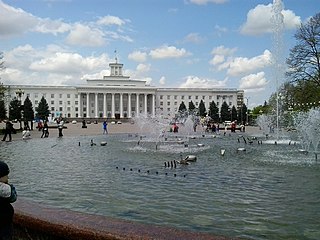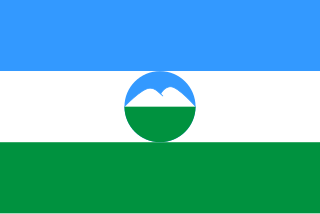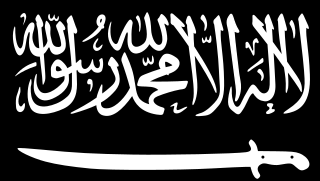Related Research Articles

Nalchik is the capital city of Kabardino-Balkaria, Russia, situated at an altitude of 550 meters (1,800 ft) in the foothills of the Caucasus Mountains; about 100 kilometers (62 mi) northwest of Beslan. It covers an area of 131 square kilometers (51 sq mi). Population: 247,054 (2021 Census); 240,203 (2010 Russian census); 274,974 (2002 Census); 234,547 (1989 Soviet census).

Kabardino-Balkaria, officially the Kabardino-Balkarian Republic, is a republic of Russia located in the North Caucasus. As of the 2021 Census, its population was 904,200. Its capital is Nalchik. The area contains the highest mountain in Europe, Mount Elbrus, at 5,642 m (18,510 ft). Mount Elbrus has 22 glaciers that feed three rivers — Baksan, Malka and Kuban. The mountain is covered with snow year-round.

Doku Khamatovich Umarov, also known as Dokka Umarov as well as by his Arabized name of Dokka Abu Umar, was a Chechen mujahid in North Caucasus. Umarov was a major military figure in both wars in Chechnya during the 1990s and 2000s, before becoming the leader of the greater insurgency in the North Caucasus. He was active mostly in south-western Chechnya, near and across the borders with Ingushetia and Georgia.

The Caucasian Front, also known as Caucasus Front or the Caucasian Mujahideen, established in May 2005 as an Islamic structural unit of the Chechen Republic of Ichkeria's armed forces by the decree of the fourth president of the Chechen Republic of Ichkeria, Abdul-Halim Sadulayev. In September 2006, Ali Taziev was appointed as the emir and commander-in-chief of the Caucasian Front by Dokka Umarov. The group eventually reorganized as "Vilayat Nokhchicho" in 2007 and became a part of the Caucasus Emirate.

The United Vilayat of Kabarda-Balkaria-Karachay, also known as Vilayat KBK, was a militant Islamist Jihadist organization connected to numerous attacks against the local and federal security forces in the Russian republics of Kabardino-Balkaria and Karachay-Cherkessia in the North Caucasus. Vilayet KBK has been a member of the Caucasus Emirate group since 2007.

Anzor Astemirov, also known as Emir Sayfullah, was an Islamist leader of a terrorist group in the republic of Kabardino-Balkaria, in the North Caucasus.

The Caucasus Emirate, also known as the Caucasian Emirate, Emirate of Caucasus, or Islamic Emirate of the Caucasus, was a jihadist organisation active in rebel-held parts of Syria and previously in the North Caucasus region of Russia. Its intention was to expel the Russian presence from the North Caucasus and to establish an independent Islamic emirate in the region. The Caucasus Emirate also referred to the state that the group sought to establish. The creation of Caucasus Emirate was announced on 7 October 2007, by Chechen warlord Dokka Umarov, who became its first self-declared "emir".

Vilayat Galgayche, formerly known as Ingush Jamaat, was an Islamist militant organization connected to numerous attacks against the local and federal security forces in the Russian regions of Ingushetia and Chechnya in the North Caucasus. Since 2007 it has been a part of the Caucasus Emirate and takes part in the Insurgency in the North Caucasus. The group is thought to be responsible for the deaths of hundreds of people, mostly policemen, military personnel and officials.

The insurgency in the North Caucasus was a low-level armed conflict between Russia and militants associated with the Caucasus Emirate and, from June 2015, the Islamic State, in the North Caucasus. It followed the official end of the decade-long Second Chechen War on 16 April 2009. It attracted volunteers from the MENA region, Western Europe, and Central Asia. The Russian legislation considers the Second Chechen War and the insurgency described in this article as the same "counter-terrorist operations on the territory of the North Caucasus region".
Ratmir Erikovich Shameyev, also known as Emir Zakariya, was a Kabardin Mujahid Emir (commander) fighting in the North Caucasus.
Asker Dzhappuyev also known as Emir Abdullah, was the leader of the Jihadist United Vilayat of Kabarda-Balkaria-Karachay organisation in the Russian Republic of Kabardino-Balkaria.

Kazbek Gekkiyev, a Russian TV news presenter and journalist for the All-Russian State Television and Radio Broadcasting Company (VGTRK) in Nalchik, Kabardino-Balkaria, Russia, was shot three times in the head and killed by a gunman outside of his workplace. The gunmen are believed to be linked to the Islamic insurgency in the North Caucasus. He was the seventh journalist killed in the North Caucasus in ten years in connection to his work.
Aliaskhab Alibulatovich Kebekov, also known as Ali Abu Muhammad, was a North Caucasian militant Islamist in Russia and the leader of the Caucasus Emirate following the death of inaugural leader Dokka Umarov. Following in the same religious tradition as Umarov, he adhered to the ideology of Salafism. The United States Department of State added Kebekov to its list of Specially Designated Global Terrorists on March 25, 2015. On 19 April 2015, Kebekov was killed by Russian security forces during special operations in the settlement of Gerei-Avlak in Buynaksk. An Avar by nationality, Kebekov was the first non-Chechen to lead the North Caucasus insurgency.

The Islamic State – Caucasus Province is a branch of the militant Islamist group Islamic State (IS), that is active in the North Caucasus region of Russia. IS announced the group's formation on 23 June 2015 and appointed Rustam Asildarov as its leader. Although it was defeated militarily as an organized force by 2017, some lone wolves still act on behalf of the Islamic State.
Zalim Borisovich Shebzukhov was an Kabardin Islamist from Kabardino-Balkaria, North Caucasus, and a leader of the Caucasus Emirate militant group.

The State Anthem of Kabardino-Balkaria is the state anthem of Kabardino-Balkaria, a federal subject of Russia in the North Caucasus, and was composed by Khasan Kardanov in 1992.

Kazbek Valeryevich Kokov is a Russian politician. He is head of Kabardino-Balkaria since October 3, 2019 . He is the son of the first president of Kabardino-Balkaria.

The Insurgency in Kabardino-Balkaria and Karachay-Cherkessia was a protracted conflict between Russian security forces and militant groups operating in the regions of Kabardino-Balkaria and Karachay-Cherkessia, located in the North Caucasus region of Russia. The conflict was part of the broader insurgency in the North Caucasus, which emerged following the end of the First Chechen War in 1996.
References
- 1 2 "Kabardino-Balkaria Insurgency Commander Killed". Radio Free Europe/Radio Liberty. 29 March 2012.
- ↑ В Кабардино-Балкарии объявили в розыск подозреваемых в убийстве охотников (in Russian). 15 November 2007. Archived from the original on 9 September 2012.
- ↑ МВД Кабардино-Балкарии по подозрению в убийстве охотников разыскивает тринадцать человек (in Russian). 31 January 2008. Archived from the original on 20 May 2009.
- ↑ "Balkar, Kabardian Insurgent Leaders Reported Killed". 29 April 2011. Archived from the original on August 8, 2011.
- ↑ "Russia Caucasus Insurgent Leader Reported Killed". Radio Free Europe/Radio Liberty. 27 March 2012.